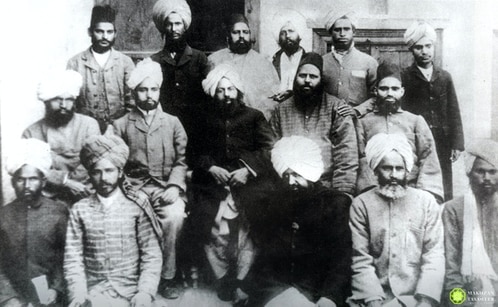Hazrat Sahibzada Mirza Bashir Ahmad Sahibra states:
“Maulvi Sher Ali Sahib narrated to me that the Promised Messiahas said that all of his Arabic writings were a form of revelation because all of them were written with the special support of God. He used to say, ‘Sometimes, I write various words and phrases without having any knowledge of their meanings and thereafter, I look them up in the dictionary and get to know [what they mean].’ Maluvi Sahib further related that the Promised Messiahas used to send copies and manuscripts of his Arabic books to Hazrat Khalifa Ira and Maulvi Muhammad Ahsan Sahib for proofreading and would say, ‘Make amendments if there is room for improvement.’ Hazrat Khalifa Ira used to read it and return it in the same way. However, Maulvi Muhammad Ahsan Sahib used to work hard and change words in some places as an amendment.
“Maulvi Sher Ali Sahib narrates that the Promised Messiahas once said, ‘Maulvi Muhammad Ahsan Sahib tries to make changes, but I know that the word I will have used will be more eloquent and coherent and Maulvi Sahib’s word will be weak. However, sometimes I keep his suggested word so that he is not discouraged that all of his presented words were removed.’
“In my [Sahibzada Mirza Bashir Ahmad Sahib’sra] view, it was the practice of the Promised Messiahas to send copies and manuscripts of Arabic books to the scholars of the Jamaat for proofreading and to make amendments if there was room for improvement. One of the reasons behind this practice of his was that they [religious scholars] would read the writings of the Promised Messiahas in that way and become acquainted with his teachings and the Jamaat. This is my own opinion and is not based on any narration.” (Sirat-ul-Mahdi, Vol. 1, pp. 82- 83)

Referring to the above-mentioned narration, the opponents of the Promised Messiah and Mahdi, Hazrat Mirza Ghulam Ahmadas, assert that he was not granted divine knowledge of Arabic and proof of this is that he used to send his Arabic books to his companions and scholars for correction. In order to give an idea as to how the Promised Messiahas would carry out his day to day activities in the service of Islam and simultaneously work on his books, we present another narration of Sirat-ul-Mahdi before our readers. When some people raised allegations against the nutrient-dense diet of the Promised Messiahas, Dr Mir Muhammad Ismail Sahibra said:
“Some people have objected to him [the Promised Messiahas] about the intake of [high caloric] foods. However, these ill-informed people do not know that he is an aged person suffering from various diseases and in spite of all this, he is single-handedly engaged in facing the entire world. Moreover, he is establishing a Jamaat with careful attention on each of its individuals. He is immersed in the work of reforming the Ummah and fighting a different kind of war with every religion. He is busy writing books day and night, not only in Urdu, but also in Persian and Arabic. Apart from writing them, he sees their copies and proofreads them and also arranges for their publication on his own.” (Sirat-ul-Mahdi, Vol. 1, p. 424)
If the Promised Messiahas used to perform almost all the necessary tasks related to the writing and publishing of his books, then the above narration gives rise to a question: Why would he send his books to others for their opinion? The answer can be found in the opinion of Hazrat Sahibzada Mirza Bashir Ahmad Sahibra that by doing so, the Promised Messiahas wanted his companions and other scholars of his time to get acquainted with the teachings of the Latter-Day Messiah of Muhammadsa.
Sahibzada Mirza Bashir Ahmad Sahibra was a companion of the Promised Messiahas. His opinion is supported by the narration of another companion, who has also explained the underlying purpose the Promised Messiahas had behind sending books to his companions. Hence, it is mentioned in narration number 605 of Sirat-ul-Mahdi:
“Dr Mir Muhammad Ismail Sahib told me [Sahibzada Mirza Bashir Ahmad Sahibra] that the Promised Messiahas used to see the copies and proofread his books himself. When he would write Arabic books, he used to read them himself and would also instruct to show them to certain scholars. Hence, the late Maulvi Abdul Karim Sahib would comprehensively proofread all the Arabic and Persian books as a proofreader.
“He [the Promised Messiahas] once said about an Arabic book that it should also be shown to Maulvi Nuruddin Sahib for proofreading after Maulvi Abdul Karim Sahib. Someone asked, ‘What is the need for this?’ The Promised Messiahas said, ‘Maulvi Sahib reads my books less frequently. In this way, he will be able to read them.” (Sirat-ul-Mahdi, Vol. 1, p. 570)

This narration confirms the opinion of Sahibzada Mirza Bashir Ahmad Sahibra and clarifies that the Promised Messiahas did not need any help in writing Arabic books. On the other hand, he was always eager to spread the God given knowledge to not only his companions but other scholars as well. Hazrat Maulana Nuruddin Sahib, Khalifatul Masih Ira – due to his old age and busy schedule, as patients from far and wide used to come to him for treatment and students used to study the Holy Quran, hadith etc. from him – at the time, did not have energy and enough time to read much of the books of the Promised Messiahas. That is why the Promised Messiahas used to send his books to him, so that he may benefit from the writings and also be acquainted with the teachings of the Imam of the age. If the companions of the Promised Messiahas had the slightest of doubt that some people were writing Arabic books for him and that Allah the Almighty had nothing to do with it, then they would never have developed a true, spiritual connection with him, which made them sacrifice their lives and wealth to spread his message to the corners of the Earth and face every kind of difficulty in achieving this goal.
The opponents keep changing their stance about the Arabic books of the Promised Messiahas. They are seemingly suffering from indecisiveness because to begin with, they said that the first Khalifa, Hazrat Nuruddin Sahibra wrote the Arabic books for the Promised Messiahas who would then publish them under his own name. Then, considering their previous opinion as irrational, they say that the Promised Messiahas used to write Arabic books on his own, but he got them corrected by his companions.
However, if the opponents had unbiasedly read the narration mentioned at the outset, it would have become clear to them that when the Promised Messiahas sent copies of his books for proofreading, he would, at the same time, say, “Make amendments if there is room for improvement,” i.e. make corrections if the readers find any kind of error, because otherwise, there was no mistake in them. It is evident from the narration of Sirat-ul-Mahdi that the Promised Messiahas said:
“I know that the word I will have written will be more eloquent and coherent and Maulvi Sahib’s word will be weak. However, sometimes I keep his added word, so that he is not discouraged that all of his suggested words were removed.”
The manner of the words of the narration, “Make amendments if there is room for improvement,” is similar to the following words of the Holy Quran:
قُلۡ اِنۡ کَانَ لِلرَّحۡمٰنِ وَلَدٌ٭ۖ فَاَنَا اَوَّلُ الۡعٰبِدِیۡنَ
“Say, ‘If there had been a son to the Gracious God, I would have been the first of worshippers’” (Surah al-Zukhruf, Ch.43: V.82), or like the first rightly guided Khalifa, Hazrat Abu Bakrra said to the Muslims of his time:
وَإنْ زُغْتُ فَقَوِّمُوْنِیْ
“If I deviate from the right path, show me the correct way.” (Al-Mu‘jam al-Awsat, Juz‘ 6, p. 227)
Hence, the Promised Messiahas never sent his books to his companions or other scholars of his age to perfect or improve his writings. On the contrary, he would share his works to increase the knowledge of his companions and spread the message of Allah the Almighty to the intellectuals and scholars.


excellent read